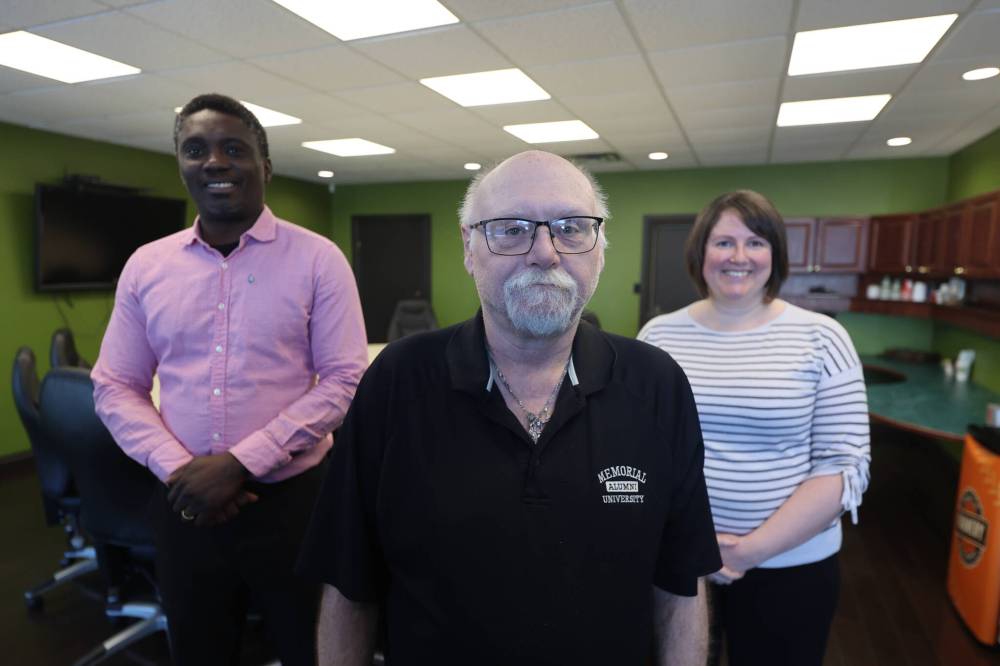CFW launches first Westman-based lending circle
Advertisement
Read this article for free:
or
Already have an account? Log in here »
We need your support!
Local journalism needs your support!
As we navigate through unprecedented times, our journalists are working harder than ever to bring you the latest local updates to keep you safe and informed.
Now, more than ever, we need your support.
Starting at $15.99 plus taxes every four weeks you can access your Brandon Sun online and full access to all content as it appears on our website.
Subscribe Nowor call circulation directly at (204) 727-0527.
Your pledge helps to ensure we provide the news that matters most to your community!
To continue reading, please subscribe:
Add Brandon Sun access to your Free Press subscription for only an additional
$1 for the first 4 weeks*
*Your next subscription payment will increase by $1.00 and you will be charged $20.00 plus GST for four weeks. After four weeks, your payment will increase to $24.00 plus GST every four weeks.
Read unlimited articles for free today:
or
Already have an account? Log in here »
Hey there, time traveller!
This article was published 04/02/2025 (321 days ago), so information in it may no longer be current.
Community Futures Westman (CFW) has launched the first Westman-based lending circle, aimed at bridging financial gaps for business owners and entrepreneurs who face difficulties in accessing traditional credit.
The initiative, inspired by similar programs in British Columbia, is designed to facilitate peer-to-peer lending and create support networks among local entrepreneurs,” Lending Circles co-ordinator Ruth Loewen told the Sun on Monday.
Many newcomers and small business owners, she explained, struggle to secure loans from financial institutions due to insufficient credit history. The lending circle model allows members to lend and borrow from each other, with all contributions reported to credit bureaus, thereby helping participants build or establish their credit scores.

Community Futures Westman business analyst Kola Oloko (from left), executive director Bill Hogan and Lending Circles co-ordinator Ruth Loewen pose for a picture at the CFW Brandon office on Monday. (Abiola Odutola/The Brandon Sun)
“This was also a way to help fill that gap,” CFW spokesperson Ruth Loewen said. “Since all contributions are reported to the credit bureau, it’s an ideal way for a newcomer to establish a credit history, as their payments are recorded as loan repayments.”
While the lending circle is particularly beneficial for those facing credit challenges, it also provides an avenue for groups, such as artists and contractors, to support each other financially.
The organization identified what it believes is a major gap in lending in Westman, executive director Bill Hogan said. “A peer-to-peer lending circle will help a lot of business owners who might not have a long credit history.”
The lending circle operates with a self-regulating model and CFW assists in forming the circle, offering training and guidance, but the policies and regulations are ultimately determined by the lending circle members themselves.
Each member, Loewen explained, contributes a monthly amount to grow the lending pool over time, adding that CFW offers ongoing business development workshops and provides access to a group loan of up to $5,000 for established circles. Once a lending circle demonstrates sustainability, CFW may also contribute financially to its growth.
Regarding the loan range, the spokesperson said loan structures vary based on the lending circle’s preferences, adding members can opt for internal loans, where the group reviews and approves loan applications, or external loans, where “pooled funds” are used as collateral for cash-secured loans through financial institutions.
Lending circles, she said, also have autonomy in setting their interest rates or opting for alternative fee structures, such as those aligned with Islamic finance principles that prohibit charging interest.
“The lending circle has the flexibility to set interest rates or fees that align with their group’s preferences,” Loewen said. “For example, some groups may choose to impose a flat fee rather than interest to accommodate religious beliefs.”
Beyond financial support, she added, lending circles foster mentorship by connecting new entrepreneurs with experienced business owners. Members can share insights, offer advice, and support each other’s growth.
“In other lending circles we’ve studied, the biggest benefit members report is the sense of community and mentorship,” Loewen said. “A business owner with 20 years of experience can guide a newcomer through challenges and opportunities.”
While the lending circle is open to all business types, CFW is initially focusing on groups with common professional backgrounds, such as artists, contractors and wedding vendors.
“There is strength in commonality,” Loewen said. “For example, contractors often face cash flow issues due to delayed payments from clients. A lending circle could provide short-term loans to cover materials before a project is completed.”
The lending circles are also expected to set their policies regarding missed payments and loan defaults. Suggested measures in CFW’s lending circle manual include “late fees, three-strike policies,” and the role of designated officers responsible for loan collections.
“For external loans through financial institutions, the bank handles collections,” Loewen said. “For internal loans, the lending circle itself manages collections.”
Interested business owners can apply to join an existing lending circle or create a new one through an application process on CFW’s website, she added. Established lending circles will have the authority to review and vote on new membership applications.
“The lending circle could provide the kick-start that a new or existing business needs to grow,” Hogan said. “In many cases, these circles become so much more than just the financial aspect as new business owners lean on established business owners for mentorship. We hope to build a community around entrepreneurship where people support each other.”
» aodutola@brandonsun.com
» X: @AbiolaOdutola
